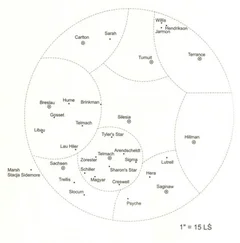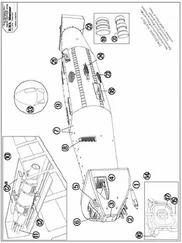David Weber - In Enemy Hands
Здесь есть возможность читать онлайн «David Weber - In Enemy Hands» весь текст электронной книги совершенно бесплатно (целиком полную версию без сокращений). В некоторых случаях можно слушать аудио, скачать через торрент в формате fb2 и присутствует краткое содержание. ISBN: , Издательство: Baen Publishing Enterprises, Жанр: Фантастика и фэнтези, на английском языке. Описание произведения, (предисловие) а так же отзывы посетителей доступны на портале библиотеки ЛибКат.
- Название:In Enemy Hands
- Автор:
- Издательство:Baen Publishing Enterprises
- Жанр:
- Год:неизвестен
- ISBN:0-671-57770-0
- Рейтинг книги:3 / 5. Голосов: 1
-
Избранное:Добавить в избранное
- Отзывы:
-
Ваша оценка:
- 60
- 1
- 2
- 3
- 4
- 5
In Enemy Hands: краткое содержание, описание и аннотация
Предлагаем к чтению аннотацию, описание, краткое содержание или предисловие (зависит от того, что написал сам автор книги «In Enemy Hands»). Если вы не нашли необходимую информацию о книге — напишите в комментариях, мы постараемся отыскать её.
In Enemy Hands — читать онлайн бесплатно полную книгу (весь текст) целиком
Ниже представлен текст книги, разбитый по страницам. Система сохранения места последней прочитанной страницы, позволяет с удобством читать онлайн бесплатно книгу «In Enemy Hands», без необходимости каждый раз заново искать на чём Вы остановились. Поставьте закладку, и сможете в любой момент перейти на страницу, на которой закончили чтение.
Интервал:
Закладка:
Perhaps even worse, the prewar Legislaturalists had gone to some lengths to make the answer to that last question "nothing," for knowledge was a dangerous thing. They hadn't wanted the Dolists educated or involved in making the system work. They might have been an almost intolerable, parasitic drag on a moribund economy, but as long as the BLS had sufficed to support their accustomed lifestyles, they'd felt no particular urge to demand the right to participate in the making of political decisions. That, after all, had been the original bargain between their ancestors and those of the Legislaturalists. In return for being "taken care of," the citizens of the PRH had surrendered all decision-making to the people who ran the machine, and until the machine collapsed, no one had felt any need to fix the host of things wrong with it.
On the grand scale, the mutual suicide pact between the Legislaturalists and their education establishment was academic as far as Harkness was concerned, but on a personal level, its consequences had become very important indeed, for Johnson and Candleman were typical products of the system from which they came. That meant they suffered from an appalling ignorance few Manticorans would have believed was possible. People who could barely handle basic math or, like Candleman, suffered from what anything but the Peep Office of Education would have called functional illiteracy, were of strictly limited utility to a modern war machine, because maintaining or servicing any equipment more complex than a pulse rifle required at least some familiarity with the basic principles of electronics, cybernetics, gravity theory, and any of scores of other disciplines. Anyone could be trained to operate modern hardware—simply surviving in a technological society required at least a surface competence—but for people like Johnson and Candleman, that competence was like the math ability conferred by learning to make change in a shopping mall. They had no more comprehension of what went on behind the input keys and the displays than someone from preindustrial Terra would have had.
That was the main reason the majority of maintenance duties in the People's Navy were assigned either to officers or to senior noncoms. If the prewar PN had wanted competent technicians, it had been forced to train them itself, and it simply hadn't had most of its conscripts long enough to overcome the disabilities with which they arrived. Its only real choice had been to train them first as operators and only secondly as true technicians, and that took time. Years of it, in most cases, which meant it was only really practical to train the people who formed its long-term, professional core.
The People's Marines had faced the same problems, though on a somewhat lesser scale. Battle armor and support weapons weren't something one wanted in the hands of technical ignoramuses, and the days when the dregs of an uneducated society could be turned into first-line soldiers without massive remedial training had gone out with the bolt-action rifle, but the Marines had always been a long-service outfit, with a lower percentage of conscripts. Coupled with their (relatively) simpler equipment, they'd been able to impose a more uniform level of training which came far closer to matching the tactical competence of their Manticoran counterparts, although maintenance remained a chronic problem even for them.
But the heavy losses the People's Navy and Marines had suffered in the opening stages of the war—not to mention the officer purges which had followed the Harris Assassinations and the casualties suffered in things like the Leveller Uprising—had cut dangerously deep into the military's trained manpower. The Committee of Public Safety had acted to recall veterans who had completed their terms of service, which had almost covered the initial shortfalls, but the only real solution had to be the education and training of the required replacements to a modern standard... preferably before they got to boot camp. There were enough realists in the PRH to recognize that, and whatever her other shortcomings, Cordelia Ransom had managed to sell it to the Mob, as well. In a sort of insanely twisted logic, the need to fight a war started to preserve a parasitic life style had led to a situation in which the parasites in question were actually willing, even eager, to abandon their parasite status, repair their schools, and learn how to provide the support their military required. It was a pity the thought of making the same repairs hadn't occurred to anyone when it might actually have averted the war in the first place.
In the meantime, however, people with real educations remained in critically short supply, and they were needed not just for the military, but also to operate the Republic's civilian and industrial infrastructure. Balancing personnel allocations between the combat arms and the people who made the weapons with which the combat arms fought remained an enormous problem for the PRH. The situation was improving—and far more quickly than the more complacent Allied leaders would have believed possible—but for the foreseeable future, manpower supplies would remain tight.
But there was at least one area in which people with minimal educations could be readily employed by the State, and that brought Harkness back to Johnson and Candleman. There was nothing fundamentally wrong with the mind either of them had been issued; it was simply that no one had ever bothered to acquaint those minds with their own potentials. They were ignorant, not stupid, and State Security didn't need hyper physicists. For that matter, even with ships like Tepes in its inventory, StateSec didn't need an enormous number of missile and gravitics techs, and those could be poached from the Navy with a suitable use of the security forces' absolute priority.
What StateSec did need, however, were shock troops and enforcers who could be relied upon to take orders and break the heads of any enemies of the People at whom they might be aimed. Seventy-five or eighty percent of its personnel fell into that category, and it didn't take a lot of education to squeeze a pulser trigger or club a dissenter. By the standards of their peers, Johnson and Candleman were of above average ability... and neither of them would have been allowed to serve aboard any ship to which Harkness had ever been assigned anyway. There was a point, after all, where ignorance became stupidity, for one could hardly expect people, however inherently bright, to allow for or protect themselves against dangers no one had ever bothered to tell them existed.
And just at the moment, Harkness' watchdogs were demonstrating that very fact.
"Look," he said after a moment, still smiling at Candleman, "Farley's Crossing isn't like the other games I've, um, modified for you guys. This one's actually a simplified version of a real Navy training simulator, and that means its parameters are a lot more complex than the other packages, right?"
He paused, eyebrows raised, and Candleman glanced at Johnson. The corporal nodded, which seemed to reassure him, and he turned attentively back to Harkness.
The Manticoran felt a brief twinge of guilt as the StateSec thug looked at him with trusting eyes terrifyingly devoid of any understanding of what he was talking about. Harkness had spent enough time in the service to feel confident that anyone StateSec might have assigned to him would have been receptive to the concept of rigging the ship's electronic games library. The combination of boredom, greed, and a very human (if ignoble) desire to put one over on one's fellows had produced the same ambition in virtually every Manticoran ship in which Harkness had ever served, and those factors operated even more strongly aboard Tepes . Still, he knew he'd been lucky to draw these two, for Johnson was an operator and black marketeer from way back. He was actually quite competent within the limits of what he knew, but he was also as greedy as they came, and neither he nor Candleman had the background to realize the consequences of giving Harkness access to the games library.
Читать дальшеИнтервал:
Закладка:
Похожие книги на «In Enemy Hands»
Представляем Вашему вниманию похожие книги на «In Enemy Hands» списком для выбора. Мы отобрали схожую по названию и смыслу литературу в надежде предоставить читателям больше вариантов отыскать новые, интересные, ещё непрочитанные произведения.
Обсуждение, отзывы о книге «In Enemy Hands» и просто собственные мнения читателей. Оставьте ваши комментарии, напишите, что Вы думаете о произведении, его смысле или главных героях. Укажите что конкретно понравилось, а что нет, и почему Вы так считаете.












